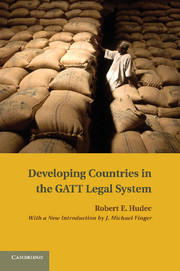Book contents
- Frontmatter
- Contents
- Foreword by Hugh Corbet
- Acknowledgments
- DEVELOPING COUNTRIES IN THE GATT LEGAL SYSTEM
- Introduction to the New Edition
- PART I A HISTORY OF THE LEGAL RELATIONSHIP
- PART II A LEGAL CRITIQUE OF THE GATT'S CURRENT POLICY
- 7 Basic Elements of the Legal Criticism
- 8 Separating Legal and Economic Issues
- 9 Impact of GATT Legal Policy on Internal Decision-making
- 10 Impact on Decisions in Other Governments: Non-reciprocity
- 11 Impact on Decisions in Other Governments: Preferences
- 12 First Steps Towards a Better Legal Policy
- List of References
- Index
12 - First Steps Towards a Better Legal Policy
Published online by Cambridge University Press: 03 May 2011
- Frontmatter
- Contents
- Foreword by Hugh Corbet
- Acknowledgments
- DEVELOPING COUNTRIES IN THE GATT LEGAL SYSTEM
- Introduction to the New Edition
- PART I A HISTORY OF THE LEGAL RELATIONSHIP
- PART II A LEGAL CRITIQUE OF THE GATT'S CURRENT POLICY
- 7 Basic Elements of the Legal Criticism
- 8 Separating Legal and Economic Issues
- 9 Impact of GATT Legal Policy on Internal Decision-making
- 10 Impact on Decisions in Other Governments: Non-reciprocity
- 11 Impact on Decisions in Other Governments: Preferences
- 12 First Steps Towards a Better Legal Policy
- List of References
- Index
Summary
THE FIRST major conclusion of this study is that none of the legal strategies currently available to developing countries appears to offer much help in improving the behavior of developed countries towards them. Developed countries are already fairly well committed to policies calling for the continuance of the gradual liberalization efforts of the past twenty years and, subject to not very rigorous graduation demands, these affirmative policies appear likely to continue under just about any legal policy. On the other hand, developed countries also seem committed to the practice of imposing new restrictions that limit developing-country exports once they begin to cause discomfort, and none of the legal strategies currently being advocated appears capable of changing this situation.
The GATT's current legal policy towards developing countries cannot promise any significant improvement. The insistent demand for non-reciprocal trade liberalization has received more political support in developed countries than critics want to acknowledge. But neither the welfare obligation nor other general value preferences appear capable of generating the kind of political force needed to bring about major improvements. The companion policy calling for preferential treatment is also capable of generating political support for certain kinds of trade liberalization. Its long-range price, though, is the creation of so much additional discrimination that the overall trade environment is left in a worse condition than before.
- Type
- Chapter
- Information
- Developing Countries in the GATT Legal System , pp. 188 - 194Publisher: Cambridge University PressPrint publication year: 2010

